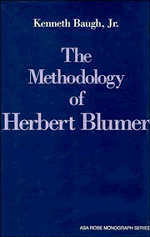Summary
This study is an interpretation of Herbert Blumer's methodology. As such, it is formed and informed by two distinct sources: a topic, Blumer's methodology, and an approach to that topic, interpretation. Whatever the topic may be in and of itself, here it appears only through interpretation, as interpretation. Any determinations constitutive of interpretation are therefore constitutive of the interpreted topic. More specifically, the assumptions and tendencies which interpretation inevitably brings to its topic predelineate the possibilities of construal, fore-favoring some constructions while forestalling others. With that in mind, I want to introduce this study by identifying some interpretive decisions which make my reading of Blumer what it is and not something else.
The first order of interpretive business is simply to locate the topic. Since Blumer's methodology is sited in an indefinite body of discourse, some limits must be set. My choice is to use only Blumer's publicly available texts. The special suitability of this choice lies in the balance it permits between deference and criticism: It at once allows a thinker to present ideas in a considered and deliberate form without thereby collapsing interpretive insight into authorial testimony. As a material witness a text can raise claims of its own over and sometimes against its author, provided, of course, that an interpreter is prepared to hear.
With Blumer's texts in hand, the question arises as to how the task of reading is to be done.
- Type
- Chapter
- Information
- The Methodology of Herbert Blumer , pp. ix - xiiPublisher: Cambridge University PressPrint publication year: 1990



